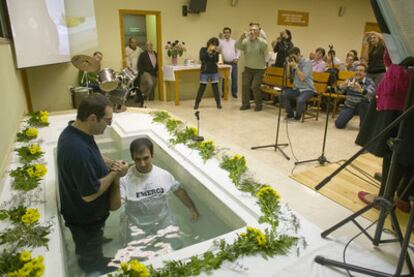Leaving Mohamed behind
Dozens of immigrants renounce Islam every year to become evangelicals
"Do you believe in Jesus Christ as the one true savior?" asks Pastor José Luis Fernández in a serious tone. "I do," replies the believer, as he allows himself to be submerged in a baptismal font the size of a small swimming pool.
This is a scene that is repeated every Sunday in Spain's evangelist churches, but what is happening in Barcelona's Les Roquetes de Sant Pere de Ribes on this particular day is special. The man being baptized is named Mohamed Karami, and is a 37-year-old industrial engineer originally from Morocco. "He is the first ex-Muslim I have baptized," says Pastor Fernández proudly.
In a soaking wet white shirt, Karami makes his way to the microphone. He speaks of the "many stages" of his life, of the "curiosity" he felt for his Latin American wife's religion, and of that special year, 2008, when he invited God into his life. "It was my new birthday," he concludes as the hundred worshippers watching, who are mainly Spanish, break into applause.
"Someday, I will tell my mother, and eventually she will accept it"
Those cheering most enthusiastically are two other pastors: Hassan, from Alhucemas in Morocco, and Said de Cabilia from Algeria, both of whom dedicate a great deal of their time to working with immigrants. Among the others there are two Moroccans who, like Karami, renounced Islam to convert to Christianity many years ago, and two young girls from Tangiers who say they have come along out of curiosity. All of them ask not to be named or photographed for fear of being recognized back home, where, they say, they could have "problems with our families if they find out."
The recently baptized Karami has not told his 73-year-old mother of his conversion yet either. "Someday, I will go to Marrakesh, I will tell her, and she will eventually accept it," he says.
The punishment in some Muslim countries for renouncing Islam is the death penalty, but even in those countries where this is not so, conversion is ultimately a social death, says Libyan journalist Camille Eid, a Christian and author of The Christians who come from Islam, published in Italy in 2006. "This is why immigrants are reluctant to declare their new faith," he says.
Karami says that when he first became interested in Christianity - through his mother-in-law - it was the joyful singing that most drew his attention. "It's difficult for Muslims to show their feelings," he explains.
His passion for his faith is surprising. But, says Eid, converts from Islam often have to face so many psychological and even legal obstacles, that their devotion is usually very real and fervent.
The majority of Muslims who do convert to Christianity choose protestant churches over Catholicism, as protestant preachers are more active in finding new converts. Pastor Said, for example, spends every Saturday afternoon at a Methodist church in Barcelona where meetings are held between converts like him and other Moroccan immigrants, who are interested in learning about the religion. Over refreshments, the Christians respond to their questions.
"Christ never said that his followers would not be persecuted," Said tells them. "You must not let yourself be intimidated."
There are no figures on the number of Muslims who convert to Christianity in Spain each year, but in France, where the Muslim community is larger, the figure is estimated to be 600. There are fewer in Spain, and most assuredly, fewer than the number of Spaniards who convert to Islam each year and who later announce their conversion. Yet, this is understandable, says Eid, as "Islam only has one door, the entrance. There is no exit."

Tu suscripción se está usando en otro dispositivo
¿Quieres añadir otro usuario a tu suscripción?
Si continúas leyendo en este dispositivo, no se podrá leer en el otro.
FlechaTu suscripción se está usando en otro dispositivo y solo puedes acceder a EL PAÍS desde un dispositivo a la vez.
Si quieres compartir tu cuenta, cambia tu suscripción a la modalidad Premium, así podrás añadir otro usuario. Cada uno accederá con su propia cuenta de email, lo que os permitirá personalizar vuestra experiencia en EL PAÍS.
¿Tienes una suscripción de empresa? Accede aquí para contratar más cuentas.
En el caso de no saber quién está usando tu cuenta, te recomendamos cambiar tu contraseña aquí.
Si decides continuar compartiendo tu cuenta, este mensaje se mostrará en tu dispositivo y en el de la otra persona que está usando tu cuenta de forma indefinida, afectando a tu experiencia de lectura. Puedes consultar aquí los términos y condiciones de la suscripción digital.








































